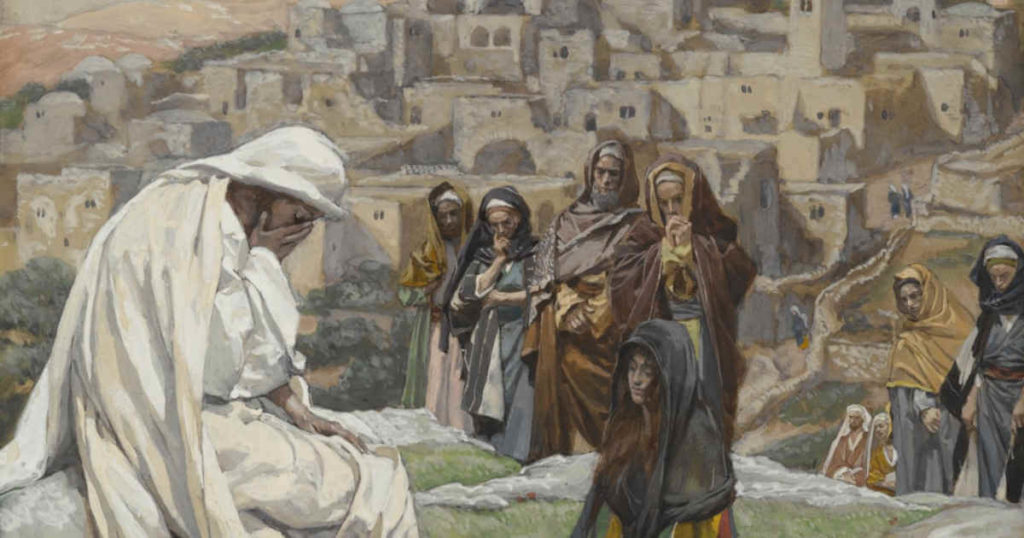Luke 19:28-44
This is a familiar Bible event, recorded by the four gospel writers. It began early on Sunday morning (Palm Sunday, we call it and which we are commemorating today) as Jesus was walking toward Jerusalem. He stopped for a moment and sent two of his disciples into a nearby village to carry out a special errand. Here is how Luke 19:29-31 records that event:
“As He approached Bethphage and Bethany at the hill called the Mount of Olives, He sent two of His disciples, saying to them,
‘Go to the village ahead of you, and as you enter it, you will find a colt tied there, which no one has ever ridden. Untie it and bring it here. If anyone asks you, ‘Why are you untying it?’ tell him, ‘The Lord needs it.’”
A. The two may have wondered about what Jesus instructed them to do, because none of the Gospel accounts about the ministry of Christ ever mention Him riding any animal to get from one place to another.
He even told them the exact words they are to use should anyone question them, “The Lord needs it.”
B. It is obvious, though, that Jesus knew what He was going to face in the city of Jerusalem. So His decision to go into Jerusalem must have been one of the most difficult Jesus ever made.
Five hundred years earlier, the prophet Zechariah had proclaimed that fact when he wrote, “Rejoice greatly, O Daughter of Zion! Shout, Daughter of Jerusalem! See, your king comes to you, righteous & having salvation, gentle & riding on a donkey, on a colt, the foal of a donkey.” (Zechariah 9:9)
Remember that, this was the beginning of the great 8-day Passover Festival, when the Jews remembered God’s deliverance of their ancestors from Egyptian slavery. Jews from all over the world were gathering in Jerusalem to celebrate, and therefore the city was filled to overflowing.
Bearing that in mind, then here comes Jesus fulfilling the prophecy of Zechariah: “See, your king comes to you, righteous and having salvation, gentle and riding on a donkey, on a colt, the foal of a donkey.” (Zechariah 9:9)
For the crowds lining the road that day, Jesus riding a colt into the city was a public declaration that He was the promised King!
I. HOW WOULD THE PEOPLE RESPOND TO THAT?
How would the people respond to that? Would they recognize that His Kingdom was not of this world, but a spiritual kingdom, and He was a spiritual King? Not likely, because He had been teaching them that for over 3 years, and still they had not learned that lesson.
A. Perhaps some of them would greet Him with laughter. Maybe they would be amused by what Jesus was doing.
B. Others would greet Him with anger upset because they would interpret His riding into the city as arrogance and blasphemy against God.
C. Of course, there are many that would hail Him with joy, welcoming Him as an earthly King who had come to re-establish the throne of David, and overthrow the Romans. They were ready eager to place a crown upon His head.
D. Among the crowds would be people He had healed. Many more had seen some of His miracles, and listened as “He spoke with authority.” They had listened, and their lives had been changed.
Jesus knew all of this. He knew that just over the horizon was the Cross, awaiting Him. But Luke 9:51 tells us that in spite of it all, Jesus still “…resolutely set out for Jerusalem.”
II. JESUS RODE TOWARD CITY
As Jesus rode down toward the gate of the city, the crowds kept growing, and there was a festive air, for it was Passover and pilgrims were gathering from far and near for this greatest of all Jewish holidays.
A. News had spread that Jesus had raised Lazarus from the dead. You can imagine the excitement as great crowds gathered on both sides of the road. They were there! Some had cut palm branches and were shouting, “Hosanna to the king!” Excitement prevailed throughout the whole city!
B. Then Jesus looked over His waiting audience. He must have seen the mixture of expressions on their faces.
1. There were those who loved Him:
Lazarus, Mary, Martha, Mary Magdalene – they were all there! Their lives reflected the love that was in their hearts for this man who had taught them, molded them and changed them.
2. There were also sinister faces there; the Sadducees and Pharisees. They were supposed to be keepers of the law, spiritual leaders. But Jesus had become so popular that they felt threatened. Filled with jealousy, they watched Him.
The Romans were there, fearing revolt and watching for any sign of rebellion against Rome. They were ready and waiting to crush any uprising.
Jesus knew, as He listened to their “Hosannas,” that soon sinister voices would drown out the voices of love – that those crying for Him to be King would soon be crying, “Crucify Him! Crucify Him!”
C. As Jesus descended along the road from the Mt. of Olives, with the crowds thronging around Him, how were the apostles reacting to all this? I imagine Peter enjoying the cheers of the crowd – maybe with one hand on his sword just in case something went wrong – thinking, “Maybe it was worth it to leave the fishnets and boats. Maybe at last we’ll get what we deserve.”
What about James and John? Do you suppose they were thinking about Jesus being crowned King so that they could be on His right and left hand in positions of authority and power?
They were all there in Jerusalem – loving faces – sinister faces – anxious apostles. Crowds almost trampling one upon another; when suddenly the whole procession stopped.
III. SUDDENLY THE WHOLE PROCESSION STOPPED
A. What had happened? The people who were closest to Jesus could see and they realized that it was He who had stopped the parade. But then they saw His face, they saw sorrow and tears. He was crying.
B. Scripture tells us that Jesus often reacted emotionally – when He saw the poor; when He saw people hungry or sick; the Scriptures say repeatedly that “He had compassion on them.”
But it only mentions two times that Jesus cried. One time He cried at the grave of Lazarus. You remember, Mary and Martha were weeping, Jesus wept with them. He shared their grief and He identified with their sorrow and despair.
IV. WHY WAS JESUS CRYING?
Now this was the second occasion. He looked at the city of Jerusalem. He saw the mass of humanity crowding there and He realized the emptiness of their lives. They had not heard the message of peace. They did not understand the purpose of His coming.
Luke 19:41-44. “As He approached Jerusalem and saw the city, He wept over it and said, ‘If you, even you, had only known on this day what would bring you peace – but now it is hidden from your eyes.
‘The days will come upon you when your enemies will build an embankment against you and encircle you and hem you in on every side.
‘They will dash you to the ground, you and the children within your walls. They will not leave one stone on another, because you did not recognize the time of God’s coming to you.'”
The NKJV uses the phrase ….. because you did not know the time of your visitation.
They had eyes, but they didn’t see. They had ears, but they didn’t hear. They missed the whole point of God’s message to them.
A. The fact they waved palm branches showed that they didn’t understand, because that is exactly what their great-grandparents had done when the Maccabees overthrew the Syrian oppressors and re-established worship in the temple.
By waving palm branches they were implying that they were ready to pick up their weapons and go to war if He would lead them!
B. Jesus said, “I didn’t come for that purpose. I came to show you a more excellent way. I came to show you the way of love.” He had said, “Love your enemies and pray for those who persecute you.” (Matthew 5:44). See also Matt 5:39-41
Those people who listened to Him must have thought, “Those are beautiful words, but surely He doesn’t expect us to love the Romans.
But that was exactly what He was saying. “Love even the Romans. Show them love!”
C. The nation of Israel had the opportunity to show Rome something new and different. But because they didn’t understand Jesus – because they completely misunderstood His mission – Jesus wept over them because the opportunity would be taken away and they would never have it again.
These were God’s people, his chosen people. God had loved them and led them across the wilderness and into the Promised Land. But they didn’t understand the Messiah when He walked in their midst. Because of that, Jesus wept.
D. What a contrast! As He approaches Jerusalem, He sees the towering Temple. But beyond that – in the years ahead – He could see the armies of Titus surrounding the Holy City. He sees Temple stones being thrown down and the whole city in flames.
He saw thousands massacred as Titus waited for Jerusalem to surrender.
Both Matthew and Luke tell us that sometime earlier Jesus looked down upon the city and had cried out, “O Jerusalem, Jerusalem…. how often I have longed to gather your children together as a hen gathers her chicks under her wings, but you were not willing.” (Matthew 23:37; Luke 13:34)
And today, just like the people of Jerusalem, we find ourselves in the presence of Jesus. I wonder what He sees when He looks at us.
Does He see people worried about so many things – about the corona pandemic, about lack of money – about job security – about their health, or lack of it? Does He see people who are so busy doing things here and there – so busy that they never bother to consider those things that are eternally important?
Or does he see people who recognize Him for who He is – The Messiah, the Christ, the Son of God?
When He turns and looks into our lives, I wonder, will He weep once again because of what He sees? Or will we have the joy that passes all understanding as we respond to His outstretched arms and hear Him say, “Well done, good and faithful servant. Enter thou into the joy of thy Lord”? Matt. 25:21,23


